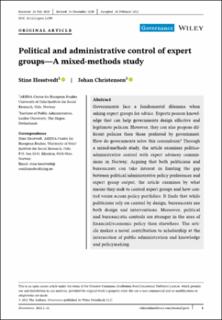| dc.contributor.author | Hesstvedt, Stine | |
| dc.contributor.author | Christensen, Johan | |
| dc.date.accessioned | 2021-06-03T10:47:06Z | |
| dc.date.available | 2021-06-03T10:47:06Z | |
| dc.date.created | 2021-04-05T15:52:36Z | |
| dc.date.issued | 2021 | |
| dc.identifier.issn | 0952-1895 | |
| dc.identifier.uri | https://hdl.handle.net/11250/2757548 | |
| dc.description.abstract | Governments face a fundamental dilemma when asking expert groups for advice. Experts possess knowledge that can help governments design effective and legitimate policies. However, they can also propose different policies than those preferred by government. How do governments solve this conundrum? Through a mixed‐methods study, the article examines politico‐administrative control with expert advisory commissions in Norway. Arguing that both politicians and bureaucrats can take interest in limiting the gap between political/administrative policy preferences and expert group output, the article examines by what means they seek to control expert groups and how control varies across policy portfolios. It finds that while politicians rely on control by design, bureaucrats use both design and interventions. Moreover, political and bureaucratic controls are stronger in the area of financial/economic policy than elsewhere. The article makes a novel contribution to scholarship at the intersection of public administration and knowledge and policymaking. | |
| dc.language.iso | eng | |
| dc.relation.uri | https://doi.org/10.1111/gove.12599 | |
| dc.title | Political and administrative control of expert groups—A mixed‐methods study | |
| dc.type | Peer reviewed | |
| dc.type | Journal article | |
| dc.description.version | publishedVersion | |
| dc.source.journal | Governance. An International Journal of Policy, Administration and Institutions | |
| dc.identifier.cristin | 1902123 | |
| dc.relation.project | Norges forskningsråd: 254767 | |
| cristin.ispublished | true | |
| cristin.fulltext | original | |
| cristin.qualitycode | 2 | |
